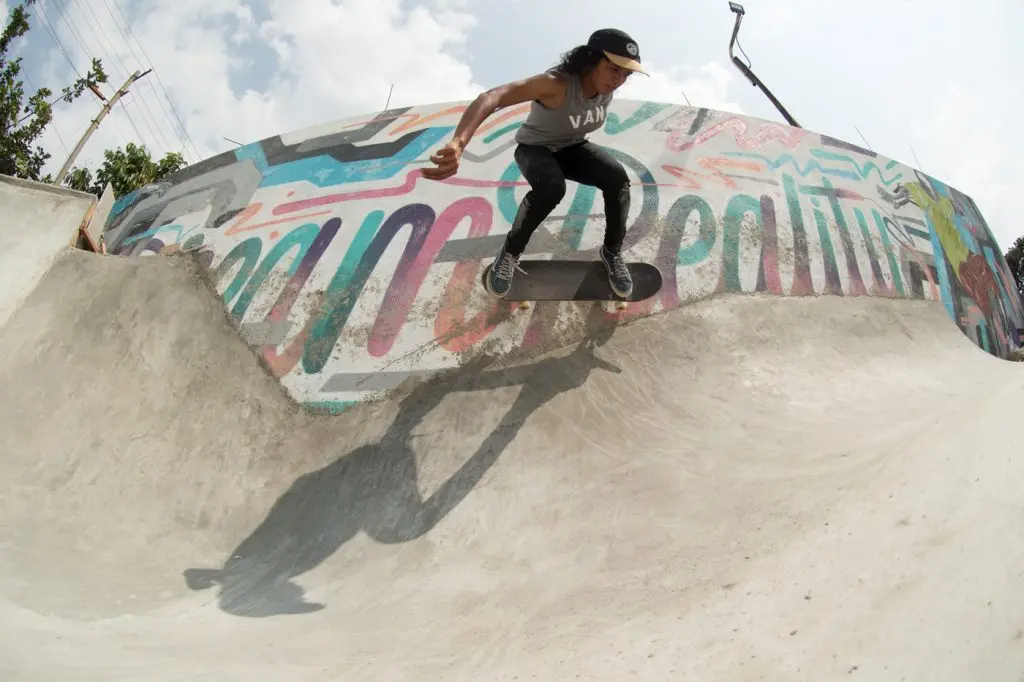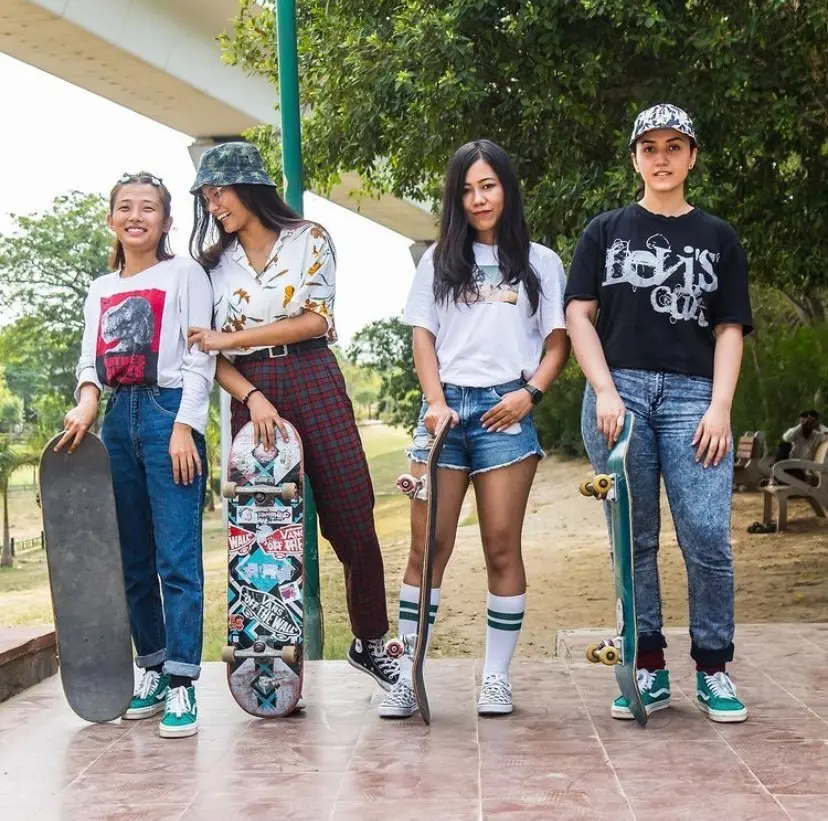Meet India's Girl Skateboarders
As more countries build skateparks and open skate shops ahead of the 2021 Olympics, we're seeing how skateboarding touches all communities differently. While skateboarding is just an activity for some, in other countries it opens up an entirely new way of life. For many girls in India, skating provides freedom from gender and class norms. Vandana K takes us through the experiences of different skaters and how skateboarding has changed their lives.
Article by Vandana K
Skate culture began to emerge in India only a decade ago. In 2009, British skater Nick Smith built a skatepark in his backyard in the coastal state of Goa in western India but it was soon shut down. He then built the first commercial skatepark for the sports complex Play Arena in the city of Bangalore in 2011. After a glitchy start and a demolished skatepark, Holystoked, a collective and company of skateboarders built a free skatepark in suburban Bangalore in 2014. The skate scene which started off with a handful of people has expanded to include an estimated 5,000 people and seen the construction of over 17 skateparks across India.
Atita Verghese’s, journey began in 2012 at a skatepark in Bangalore. “In the beginning, I knew only two other girls who were skating but the number has grown since and now I can't keep track. A lot of young girls who are skateboarding in India are really good at it,” she said. Atita, now 27, a formerly sponsored skateboarder and surfer runs the Girl Skate India Instagram page to bring awareness to India's skate scene.
Nani Waii Sonam and Mopi Hailey are “skating friends” from the Himalayan state of Arunachal Pradesh located in north-east of India, a region that is characterized by its remote hilly terrain, largely indigenous population, a history of political instability and lack of development. Many youth from the north-east migrate to big cities in ‘mainland’ India for higher education and employment. They often face harassment because of race, gender and cultural differences.
Nani, 24 is from Papu Nalah, a village close to Itanagar, the capital of Arunachal Pradesh. She belongs to the Nyishi tribe. She clearly remembers the day she took her younger brother’s unused skateboard and went to Benjiloma, a local skatepark she had seen on Instagram.
“Everyone laughed at me because I had such a small skateboard but I was so excited,” she said. In March 2020, India went under lockdown and Nani who runs a small restaurant had plenty of time, so she “skated like hell, everyday from morning to evening - at the park, sports ground, the highway, whatever place I could find.”
Skateboarding opened new doors for Nani. She was featured in a music video in which she cruised down a hill. “I used to have a small circle. I met a lot of people because of skateboarding. Now I have a lot of friends,” she said. The first customer at Nani’s restaurant after the lockdown was a skateboarder.
Mopi considers herself a beginner skateboarder. The 24-year postgraduate student, who is from the Puroik tribe learnt skating from her boyfriend in 2019. “Skating with friends is very cool and I find it stress relieving,” she said.
Although the number of skateparks in India is on the rise, finding a spot to skate can be a hurdle in a city, with skaters often using public spaces such as public parks, shopping complexes and metro station exteriors as their playground. Mopi recalls “fights with roller skaters” who didn't want to share the space with skateboarders at the public skating rink in Deer Park in Delhi.
Being a woman in India is tough. But being a woman who comes from a Dalit or indigenous community with a rural and impoverished background compounds the number of challenges one faces when taking up an unconventional sport.
When Shraddha Gaikwad used to sit in the back row of the classroom some years ago, she could not predict that she would be skateboarding one day. Born in the Mang community, the 15-year old was raised in the small town of Parli Vaijnath in Maharashtra, a state in western India.
The Mang are Dalit, a term used for communities at the lowest rung of the archaic and brutal caste system that is still practiced in India. Shraddha recalls how she and other Dalit students in her school were subjected to a modern form of ‘untouchability’ - they could not stand next to children from upper castes, nor were they allowed to sit in the front of the classroom.
Three years ago, Shraddha and her family migrated to the city of Pune in search of a better life. Her father got a job as a security guard at Decathlon, a major sporting goods store. Shraddha would bring him lunch everyday after she finished school and that was when she first saw a young employee of the store skateboarding.
“It looked like fun and I wanted to try it out but I was too afraid to ask for help. There was a trial skateboard in the store and I began to teach myself how to use it on the basketball court outside the store,” she said. The employee saw her skating and realized she was good, so he began to give her free lessons. Today Shraddha is a sponsored skater who competes at events. She is one of the growing number of girls and women who are skateboarding in India.
Asha Gond, 21 is a skateboarder and aspiring rap artist from Janwaar, a village in the central Indian state of Madhya Pradesh. She is from the Gond community. The Gonds are Adivasis, a term used by many indigenous and tribal communities to identify themselves in India. The adivasis have been traditionally relegated to the margins of the society like the Dalits.
Asha dropped out of school in 9th grade because of her family’s financial difficulties. After Rural Changemakers built a skatepark in her village (Janwaar Castle) she began to skate there. She remembers the shaming she faced from people in her village when she began skateboarding as a teenager. People wrote obscene words about her on the walls of the skatepark. “My relatives would discourage my parents from allowing me to skate by saying things like I needed to learn household chores like other girls and stop hanging out with boys,” she said.
“If I didn’t skate, I’d be married and have had kids by now. Whatever I am today is because of skateboarding.”
- Asha Gond
But Asha persisted and even convinced her parents to send her on a study abroad program in the UK sponsored by Rural Changemakers. “My mother began to trust me more after I went to London. Now she is the one who stands up to people.” Nowadays Asha studies over 6 hours daily online and with the help of tutors so that she can appear for her 10th grade exams. She is also a co-founder and volunteer at The Barefoot Skateboarders, a young non-profit that encourages kids in her village to skateboard and study. “If I didn’t skate, I’d be married and have had kids by now. Whatever I am today is because of skateboarding,” she said.
Asha is not the only one who managed to escape an early marriage. Shraddha’s voice was choked with emotion as she talked about her teenage girlfriends back in her village. “They have been married off by their parents and also have children,” she said. Shraddha also said that many have been sent to work on sugarcane plantations, known for their extremely exploitative work conditions.
“I want to be very good at skateboarding so that I can tell the people back home that girls can do everything. Don't marry them so early. They have dreams too,” she said.
Shraddha’s father lost his job in the lockdown and now runs a coconut water cart. Every weekend, he wraps up his cart and takes her to a few spots in the city where spends afternoons skating with her local crew at Pune Skateboarding. It is far easier to buy a skateboard in India than it was a decade ago but access is still a barrier for those who would like to try out the sport. “Skateboards are expensive. I had to use all my pocketmoney to buy my first board,” said Mopi. A skateboard for adults costs anywhere between 5,000 ($68) to 15,000 rupees ($206).
There are a few Indian skateboard brands but skate clothing and gear tailored for women’s needs remains missing. Atita recalls requesting the father of one of her students to get protective gear for herself from a trip to Singapore. “The need is there. As more girls skate, women-centric skateboarding brands will emerge in India in the future,” she said.




